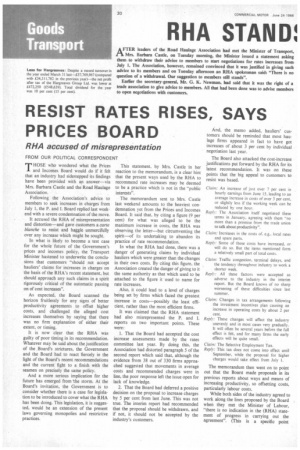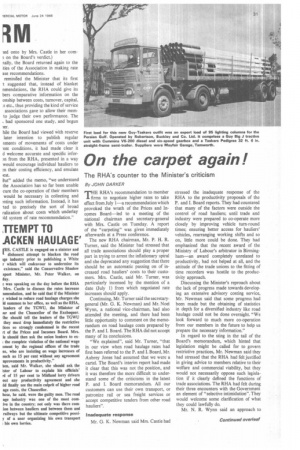RESIST RATES RISES, SAYS PRICES BOARD
Page 32

Page 33

If you've noticed an error in this article please click here to report it so we can fix it.
RHA accused of misrepresentation
FROM OUR POLITICAL CORRESPONDENT
THOSE who wondered what the Prices and Incomes Board would do if it felt that an industry had sidestepped its findings have been provided with an answer—via Mrs. Barbara Castle and the Road Haulage Association.
Following the Association's advice to members to seek increases in charges from July 1, the P. and I. Board replied last weekend with a severe condemnation of the move.
It accused the RHA of misrepresentation and distortion—and gave customers a carte blanche to resist and haggle unmercifully over any increase which might be sought.
In what is likely to become a test case for the whole future of the Government's prices and incomes policy, the Transport Minister hastened to underwrite the conclusions that customers "should not accept hauliers' claims for increases in charges on the basis of the RHA's recent statement, but should approach any such claims in a spirit rigorously critical of the automatic passing on of cost increases".
As expected, the Board scanned the horizon fruitlessly for any signs of better productivity agreements to offset higher costs, and challenged the alleged cost increases themselves by saying that there was no firm explanation of either their extent, or timing.
It is now clear that the RHA was guilty of poor timing in its recommendation. Whatever may be said about the justification of the Board's strictures, the Government and the Board had to react fiercely in the light of the Board's recent recommendations and the current fight to a finish with the seamen on precisely the same policy.
And a more serious implication for the future has emerged from the storm. At the Board's invitation, the Government is to consider whether there is a case for legislation to be introduced to cover what the RHA has been doing. This legislation, it is suggested, would be an extension of the present laws governing monopolies and restrictive practices. This statement, by Mrs. Castle in her reaction to the memorandum, is a clear hint that the present ways used by the RHA to recommend rate increases may be deemed to be a practice which is not in the "public interests".
The memorandum sent to Mrs. Castle last weekend amounts to the heaviest condemnation yet from the Prices and Incomes Board. It said that, by citing a figure (9 per cent) for what was alleged to be the maximum increase in costs, the RHA was observing the letter—but circumventing the spirit—of its undertaking to abandon its practice of rate recommendation.
In what the RHA had done, there was a danger of generating claims by individual hauliers which were greater than the changes in their own costs. By citing this figure, the Association created the danger of giving to it the same authority as that which used to be attached to the figure it used to name for rate increases.
Also, it could lead to a level of charges being set by firms which faced the greatest increase in costs—possibly the least efficient, rather than the most efficient firms.
It was claimed that the RHA statement had also misrepresented the P. and I. reports on two important points. These were: I. That the Board had accepted the cost increase assessments made by the rates committee last year. By doing this, the Association had distorted paragraph 5 of the second report which said that, although the evidence from 38 out of 330 firms approached suggested that movements in average costs and recommended charges were in line, the poor response left the issue open for lack of knowledge.
2. That the Board had deferred a positive decision on the proposal to increase charges by 5 per cent from last June. This was not true. The interim report had recommended that the proposal should be withdrawn, and if not, it should not be accepted by the industry's Customers. And, the memo added, hauliers' customers should be reminded that most haulage firms appeared in fact to have got increases of about 3 per cent by individual negotiation last year.
The Board also attacked the cost-increase justifications put forward by the RHA for its latest recommendation. It was on these points that the big appeal to customers to resist was based.
Claim: An increase of just over 7 per cent in hourly earnings from June 15, leading to an average increase in costs of over 3 per cent, or slightly less if the working week can be reduced by one hour.
Reply: The Association itself negotiated these terms in January, agreeing with them "no more than a promise from the trade union to talk about productivity".
Claim: Increases in the costs of. e.g.. local rates and spare parts.
Reply: Some of these costs have increased, or will do so. But the items mentioned form a relatively small part of total costs.
Ctaim: Traffic congestion, terminal delays, and the tendency throughout industry to work a shorter week.
Reply: All these factors were accepted as adverse to the industry in the interim report. But the Board knows of no sharp worsening of these difficulties since last summer.
Claim: Changes in tax arrangements following the investment incentives plan causing an increase in operating costs by about 2 per cent.
Reply: These changes will affect the industry unevenly and in most cases very gradually. It will often be several years before the full effect is felt, and for many firms the early effects will be quite small.
Claim: The Selective Employment Tax.
Reply: This tax does not come into effect until September, while the proposal for higher charges would take effect from July I.
The memorandum then went on to point out that the Boarci made proposals in its previous reports about ways and means of increasing productivity, so offsetting costs, particularly labour costs.
While both sides of the industry agreed to work along the lines proposed by the Board when they met the Minister of Labour, "there is no indication in the (RHA) statement of progress in carrying out the agreement". (This is a specific point led onto by Mrs. Castle in her corn s on the Board's verdict.) rially, the Board returned again to the ties of the Association in making rate ase recommendations.
reminded the Minister that its first t suggested that, instead of blanket nmendations, the RHA could give its bers comparative information on the onship between costs, turnover, capital, .s etc., thus providing the kind of service associations gave to allow their memto judge their own performance. The , had sponsored one study. and begun ter.
hile the Board had viewed with reserve later intention to publish regular sments of movements of costs under .ent conditions, it had made clear it d welcome accurate and specific inform from the RHA. presented in a way would encourage individual hauliers to m their costing efficiency, and emulate est.
3ut" added the memo, "we understand the Association has so far been unable cure the co-operation of their members would be necessary in collecting and !nting such information. Instead, it has ted to precisely the sort of broad ralization about costs which underlay
system of rate recommendation.
TTEMPT TO ACKEN HAULAGE'
FRS. CASTLE is engaged on a sinister and dishonest attempt to blacken the road tge industry prior to publishing a White r which will endeavour to undermine its existence," said the Conservative Shadow sport Minister, Mr. Peter Walker, on day.
was speaking on the day before the RHA Mrs. Castle to discuss the rates increase nmendation, and he said that if the Minister y wished to reduce road haulage charges she Id summon to her office, as well as the RHA, leaders of the TGWU, the Minister of or and the Chancellor of the Exchequer. he should tell the leaders of the TGWU they must drop immediately the restrictive ices so strongly condemned in the recent rt of the Prices and Incomes Board. Mrs. le should then ask the union leaders to ex I the complete violation of the national wage ement by the regional offices of the trade as, who are insisting on wage increases of auch as 15 per cent without any agreement nprovements in productivity."
hen, said Mr. Walker, she should ask the ister of Labour to explain his officials' rd of 15 per cent to Midland lorry drivers out any productivity agreement and she dd finally see the main culprit of higher road age costs. the Chancellor.
hese, he said, were the guilty men. The road age industry was one of the most cornlye in the country; not only was there coinion between hauliers and between them and railways but the ultimate competitive possiy of a user organizing his own transport his own lorries.
























































































































